
Search
ZanaAfrica Foundation and The Population Council are in Southeastern Kenya’s Kilifi County hoping to answer a question that’s of interest not only to the area’s health workers, educators and residents but has implications for adolescent girls throughout the developing world. They’re testing whether menstrual hygiene (access to sanitary pads) and reproductive health education helps keep girls in school and improves social and health outcomes.
“For many adolescent girls around the world, puberty is a vulnerable time when they face various pressures and challenges—including sexual harassment, abuse, early marriage, and unintended pregnancy—which threaten their health and well-being. These challenges are amplified when girls lack the knowledge and tools they need to navigate puberty safely and with dignity,” according to ZanaAfrica Foundation, an organization supporting Kenyan adolescent girls to stay in school by providing reproductive health education and sanitary pads.
“In Kenya, girls drop out of school at a higher rate than boys beginning at puberty, and many do not have access to reliable reproductive health education as they enter adolescence. Access to menstrual hygiene products and sexual and reproductive health education is thought to help reduce school absence and improve health and social outcomes, however, little rigorous evidence exists to date.” (Read More)
TaroWorks’ field services app and Salesforce.com-powered cloud database are being used to help stage a randomized controlled trial (RCT) on the efficacy of reproductive health education and menstrual hygiene products by managing the distribution of sanitary pads to over 5,000 adolescent girls in 140 primary schools in Kilifi County, Kenya.
My colleague Roger Gichuhi and I made a field visit to the ZanaAfrica Foundation office in Kilifi as we wanted to watch the sanitary pad distribution process from start to finish. During a meeting with ZanaAfrica Foundation Senior Program Manager Alfred Muli and his team, Alfred gave us an overview of how they’re using Salesforce and TaroWorks to both track the girls’ attendance at school and the distribution of sanitary pads in each school. He also explained how information flows between TaroWorks and Salesforce as part of an integrated M&E system designed by Vera Solutions.
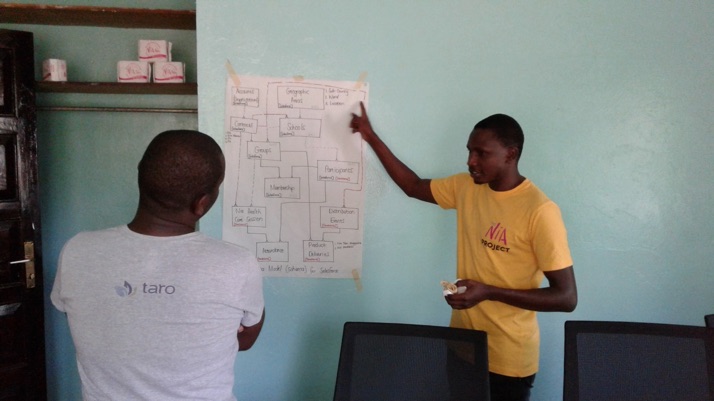
Image: ZanaAfrica’s Alfred Muli explains to TaroWorks’ Roger Gichuhi how data flows between TaroWorks and Salesforce. Source: TaroWorks
Alfred assigns schools to his team members, which they’ll subsequently visit to distribute sanitary pads. Before the team collects a batch of pads to deliver, they sync the TaroWorks app on their mobile devices to the cloud database to download assignments so each team member knows the school they’ll be visiting. Alfred, who led our group for the school visit we’d be making that day, showed us how he assigns schools to the team members in Salesforce and then completed the TaroWorks sync so we’d be ready for the next task – loading sanitary pads into our vehicle for a trip to the first school we’d visit that day.
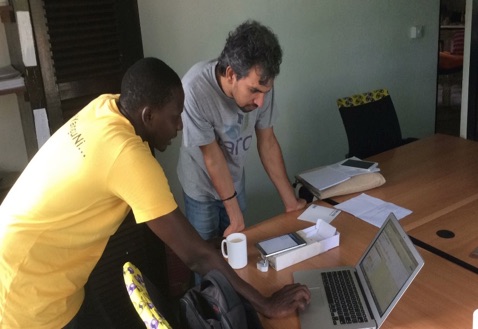
Image: ZanaAfrica’s Alfred Muli shows TaroWorks’ Sandeep Sharma how schools are assigned to team members. Source: TaroWorks
We first went to the warehouse where the menstrual hygiene supplies are stored, collected the required number of sanitary pads in boxes and loaded them into our vehicle. We then left the warehouse, arrived at the first school after three hours on the road and unloaded our cargo.
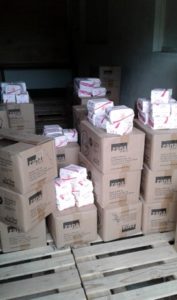
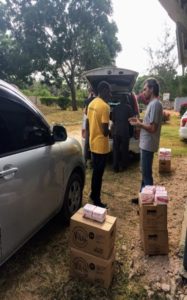
Images: Sanitary pads being loaded into vehicles. Source: TaroWorks
We asked the principal of the school to call the group of girls who are participating in the menstrual hygiene and reproductive health education study and after a few minutes, the girls came out of the classes so we could start the distribution. Alfred began calling names of the girls from the list in TaroWorks and gave sanitary pads to each. Once he handed over a packet of pads to a girl, he marked “Product Delivered” in TaroWorks app.
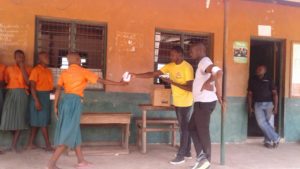
Image: ZanaAfrica’s Alfred Muli handing out a packet of pads using the names of adolescent girls on his TaroWorks app. Source: TaroWorks
After finishing distributing pads to the girls in the first school, we headed to the second school on our list. Once we reached that location, we repeated the process – take out the boxes, ask the principle of the school to call the girls, give pads to girls and mark “Product Delivered” in TaroWorks.
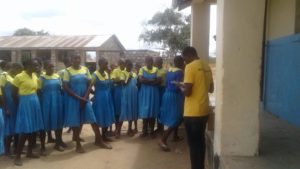
Image: ZanaAfrica’s Alfred Muli marking “Product Delivered” once a packet of pads is given to a girl. Source: TaroWorks
Have a look at this video to see how Alfred used TaroWorks to distribute sanitary pads to the girls. On a side note, once we finished the distribution of sanitary pads, Alfred gave us a demo of hand-washing tool in the school.
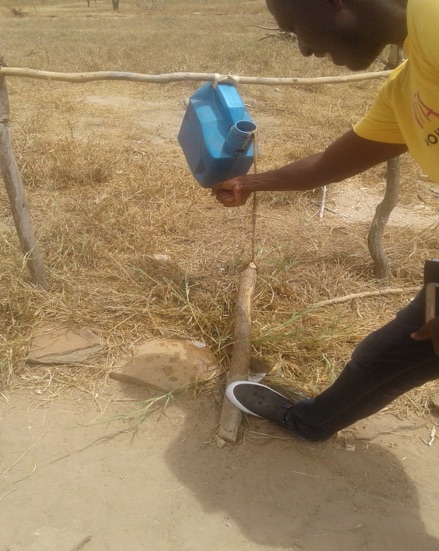
Image: Hand-washing station. Source: TaroWorks
Our third stop of the day was yet another school but this time we met mentors and watched them deliver reproductive health education to adolescent girls. These mentors engage the girls in a fun way while delivering very important health information.
We also used this visit as an opportunity to speak with the mentors about their experience using TaroWorks as part of the menstrual hygiene and reproductive health education RCT and whether they benefit from the app in their day-to-day operations.
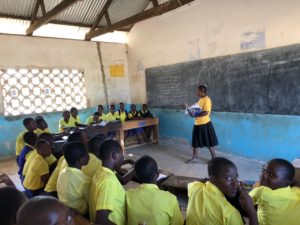
Image: A mentor conducting a session to educate girls on reproductive health. Source: TaroWorks
When I asked the mentors what TaroWorks features and functionality we might want to improve, they said “typing” data into the device in the field took time but, they added, had become easier over the time. I wondered if it might be helpful to be able to record an audio answer to a question using TaroWorks and a mobile device rather than typing in the answer? These are the kind of product enhancements we look into regularly after speaking with TaroWorks users.
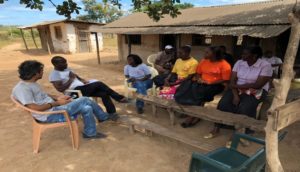
Image: TaroWorks’ Roger Gichuhi and Sandeep Sharma meet with reproductive health mentors.
It’s also great to hear from TaroWorks users when they tell us about how our tools and technology are making their work easier. I’ll end with a comment from one such user:
“TaroWorks has made my life so easy. It is simple and easy to use. It has enabled me to get information accurate and faster,” said a mentor team leader. “I can locate a school by location and can follow-up with the mentor assigned to the school if I see no activity by the end of a day. I don’t need to wait for weeks to get information and take action.”
POST TOPICS
Sign up to receive emails with TaroWorks news, industry trends and best practices.
TaroWorks, a Grameen Foundation company.
Site by V+V